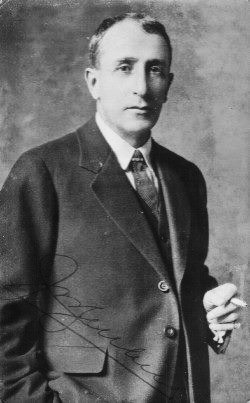 |
| Jorge Ubico y Castañeda |
Jorge Ubico was born on November 10, 1878, the son of Arturo Ubico, a wealthy lawyer and an active member of the Guatemala Liberal Party. There is a tradition that his surname came from the English name Wykam, and the family originated in Dorsetshire. Jorge Ubico was educated in Guatemala and then studied in the United States and in Europe.
In 1897 Ubico was commissioned second lieutenant in the Guatemalan army; he was subsequently gazetted lieutenant colonel and then became a full colonel in 1916 at the age of 28. He had already gained a formidable reputation for rooting out banditry and smuggling over the Guatemalan-Mexican border.
In 1920 he returned to Guatemala City to take part in the coup d'état that propelled General José Orellana into power. Orellana rewarded Ubico by making him a general two years later. However, in 1923, Ubico resigned from the army, disillusioned by what Orellana had been doing.
  |
Deciding to enter politics, Ubico helped form the Political Progressive Party in 1926. A liberal, he campaigned to improve the lot of poor people in Guatemala. He worked in various parts of Guatemala and became the chief of staff of the armed forces and then minister of war before, on February 14, 1931, becoming president for a six-year term of office.
His election was unopposed and unanimous. The Guatemalan constitution at the time had a clause forbidding reelection, and this would normally have meant that he would have had to step down in 1936. However, the constitution was amended, and Ubico remained in office until July 4, 1944. Essentially, he was the dictator of the country, presiding over an authoritarian regime.
Ubico's political allies became known as the "Ubiquatas," and they quickly took over the running of the country. To raise Guatemala's foreign revenue, Ubico concentrated on the production of coffee, but the worldwide Great Depression caused major financial problems. In spite of this Ubico was able to massively extend the network of roads throughout the country and improve health and educational facilities.
He also passed decrees abolishing debt slavery and introduced strict vagrancy laws, which saw all Guatemalans given identity cards for the purpose of enforcing employment. Many were forced to work on banana plantations for very low wages, and the fact that they could leave did not mean that they could find another job.
As the depression eroded the income that Guatemala was earning, Ubico became more pro–United States. Under his presidency, the United Fruit Company became the major economic force in the country, coming to dominate many sectors of the economy, not just the growing and harvesting of bananas. It operated the telegraph system, the only railway in the country, its own electricity generators, and the port of Puerto Barrios on the Atlantic seaboard.
Throughout the period when Ubico ran Guatemala, he was determined to ensure that his government did not become corrupt and was said to have pored over the account books of government departments throughout the country.
He also let it be known that anyone found guilty of corruption was to be instantly punished. His father had promised to shoot him if Ubico was ever involved in corruption himself. However, detractors pointed out that he did not need to be involved in graft.
His salary as president was U.S. $120,000 a year—at that time the U.S. president was being paid $75,000 annually. The Guatemalan congress also once met and voted him $160,000 ex gratia payment for services to the country.
Ubico also ensured strong press censorship in the country. On a personal level he was interested in radios and broadcasting, and he regularly made speeches on the radio.
A strong ally of the United States, Ubico was a firm anticommunist. During World War II Ubico was a keen supporter of the Allies and was distrustful of the large German minority in the country. Guatemala did eventually declare war on Germany on December 9, 1941.
After 1939 his regime became more unpopular, with the president reacting harshly in paranoid fear of his political opponents. A general strike in June 1944 led to his resignation. He was replaced by General Jorge Ponce Vaides on July 4, and a military coup on October 20, 1944, swept away his entire regime. He fled to the United States and died on June 14, 1946, in New Orleans, Louisiana.